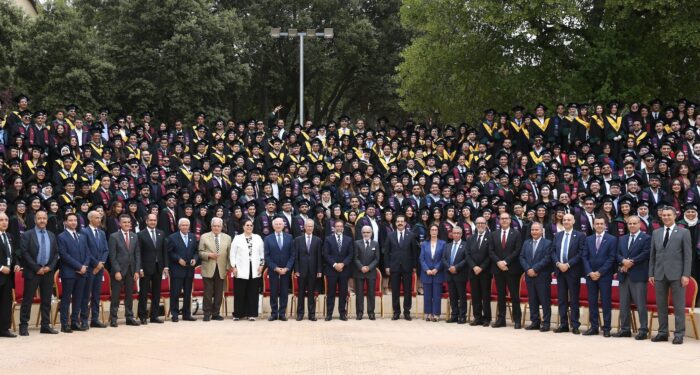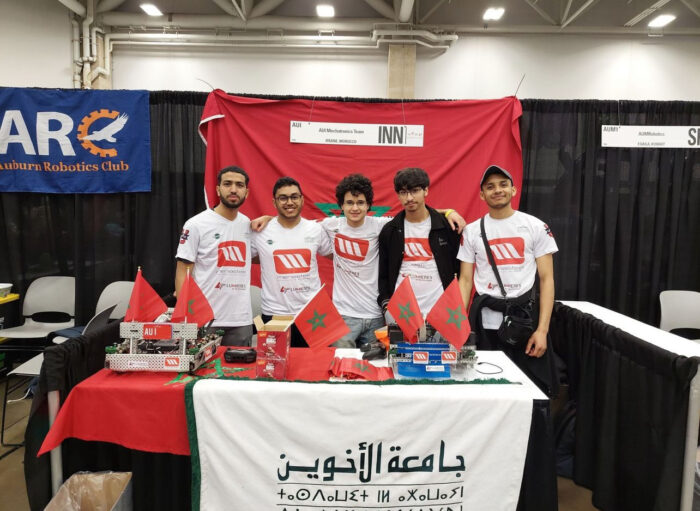During the sideline events of Gitex Africa, AUI President Amine Bensaid elaborated on the launch of new digital programs aimed at meeting the growing market demand for qualified talents in disruptive technologies, prepared to excel in a rapidly changing world.
Following your accreditation as a university that meets the international standards of American universities, what are your short-term development priorities?
Our positioning as a Moroccan university that adheres to the international standards of American universities, equipped with the prestigious NECHE accreditation, akin alongsideto renowned institutions like Harvard and MIT, compels us to focus on two main priorities. The first involves our ability to adapt to Gen-Z and the continuously evolving job market.
Al Akhawayn University in Ifrane aims to facilitate rapid access to the job market for our graduates, based on tailored technical skills and a foundational set of competencies that shape the human dimension of the student.
“This endeavor to enhance our human capital also aims to support a transformation within Gen-Z, who are more motivated by skill development, the impact they can have, and well-being, rather than merely job access”
Our second operational priority is to equip our students throughout their university journey with knowledge that enables them to integrate a multidimensional perspective and an awareness of the importance of deliberately working towards a serene and fulfilling life, with skills that facilitate this quest in their post-graduation journey.
This priority is based on observing the risks for Gen-Z associated with new technologies and the rapid pace of change in today’s world. Our efforts in enhancing our human capital also aim to support a transformation within Gen-Z, who are more motivated by skill development, the impact they can have, and well-being, rather than merely job access.
Given the distinct interests and characteristics of Gen-Zthis generation compared to the previous generation, our university also aims to facilitate a symbiosis between new talents (Gen-Z) and experienced managers and professionals (often from previous generations) in the job market. The employability rate of our graduates is a testament to this, ranging from 87% to 100% in engineering disciplines upon graduation.

How has the AUI School of Engineering adapted to digital transformations to update its training degree offerings in AI and Big Data?
The shift for AUI’s School of Engineering began in the 2020-21 academic year. Currently, this school educates has approximately 1,680 students out of a total of 3,750 across all disciplines. Specifically, we have decided to simultaneously launch several new Bachelor’s and Master’s programs focusing on disruptive topics such as artificial intelligence and robotics, Big Data analytics, Industry 4.0, Cloud computing, and mobile software design.
The goal of this overhaul in our training offerings is to meet the demand and needs for qualified resources expressed by the digital ecosystem, both nationally and internationally.
This revamping of our training degree offerings has led to an exponential increase in the number of enrollments in our School of Engineering. Today, the number of students has more than tripled, from 475 students in 2020 to 1,680 students at the start of the 2023-24 academic year.
Beyond the distinct approach between the Faculty of Humanities and Social Sciences and the School of Engineering or the Business School, how do you bridge these two distinct disciplinary worlds, including in relation to the digital field?
Our approach is transversal; this is inherent in the American « liberal arts » model adopted by Al Akhawayn University since its inception. Alongside strengthening the training degree offercatalog of the School of Engineering, the AUI Business School has also bolstered its courses by launching specialties in digital marketing and « AI and Business Analytics, » which include specific modules related to digital marketing, AI, Big Data, and Industry 4.0.
Our Business School capitalizes on the exceptional performance of its students in specialties that combine business disciplines with quantitative and computer science disciplines. Indeed, the 2023 cohort of our Business School ranked in the top 5% worldwide in the « Quantitative Analysis » discipline and in the top 6% worldwide in the « Information Systems » discipline among students from the 3,000 business programs worldwide who participated in the 2023 MFT (Major Field Test) in Business exam.
The goal is to train graduates capable of possessing both a technical and business background, with various combinations of major and minor specialties, according to the student’s affinities and/or the employer’s needs, compatible with the dynamics of the job market and the growth of companies driven by technological disruptions such as AI and Big Data.
To support this growth in our various faculties’ school programs, our faculty, and our students, we have received built eight new residential buildings this year and plan to open four new academic buildings with new laboratories and six additional residential buildings by the summer of 2024, to accommodate 5,000 students by 2026.

The opening up to and partnership with the private sector have always been an attractive argument for student recruitment at AUI. What is your approach to partnering with the private sector in the era of telecommuting and employee nomadism?
The major innovation in this area is the integration of the « experiential » component into our training programs. For example, we have developed a work-study trainingco-op formula (formation en alternance) starting from the second year of our programs, allowing students to spend the first semester at the university and the second in a company.
We launched this formula with, today, fourteen (14) partner companies. We have increased the agility in these training programs thanks to our branch in Casablanca, which allows our students to mix, very early on, between active life and academic training.
We have also innovated with our partners, such as the Moroccan subsidiaries of Leyton, Capgemini, Alten, and A&K, where our students, residing on our campus in Ifrane, are recruited in telecommuting mode, often for international clients, parallel to their university studies.
Currently, we offer this telecommuting formula for our students with eight partner companies. Negotiations are also underway for training partnerships developed jointly with multinational technology companies.
Beyond training and job market access, a university’s ranking depends on its research laboratories and its researchers’ publications. What is the state of play ??? at AUI in terms of R&D?
AUI aspires to be a leader in education that values entrepreneurial learning, academic leadership, and innovative and creative approaches to equip Gen-Z students with transversal skills, enabling them to have the mindset and competencies suitable for generating added value for their companies and having a tangible impact on economic and social levels, including at the internationally .level.
This pragmatic vision also guides our approach to R&D. In other words, our focus is not merely on increasing the number of our scientific publications. The challenge is to develop an R&D ecosystem that has a real and concrete impact on our country’s needs.
For instance, to serve our immediate environment, our R&D focuses on issues such as water optimization, forest fire protection, renewable energies to combat the winter cold experienced by our fellow citizens in the mountains, and the impact of AI on education.
Additionally, given AUI’s distinctive model and experience, we have successfully secured EU funding as the lead institution on an ambitious €1 million project related to studying investigating leadership and innovation in higher education.
Written by Rachid Jankari, edited in English by Jankari consulting, a TelQuel partner company
Read for free our Gitex Africa 2024 special issue of TelQuel Impact (French): GITEX.telquel.ma/special




